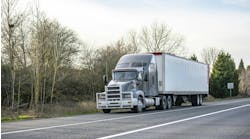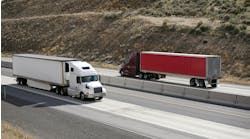The Kroger Family of Companies’ supply chain team moves several million items across the country every day. The grocer operates and maintains 44 distribution centers across the U.S., while Kroger’s store delivery fleet of tractors and trailers make thousands of deliveries daily.
To drive its sustainability progress, Kroger’s supply chain team set an ambitious goal for its fleet: to improve fleet efficiency by 20% by 2020 from a 2010 baseline. The grocer ranked 320 on this year’s FleetOwner 500: Top Private Fleets list.
“Our supply chain team continues to track our ton-miles per gallon, which effectively looks at how many miles we haul one ton of groceries on one gallon of fuel, from Kroger-controlled inboard and outbound loads to our stores and throughout our transportation network,” Kroger officials stated in the company’s most recent Environmental, Social and Governance (ESG) report.
“By the end of 2018, we had achieved an improvement of 10.21% since 2010 due to ongoing evaluation of new technologies and increasing efficiencies in how we make deliveries and operate our equipment,” Kroger representatives said in the ESG report.
To drive efficiency into its fleet, Kroger replaces old vehicles with newer, more efficient assets. By investing in 234 new tractors in 2018, the grocer reported that it reduced fuel spend and continued to increase its fleet’s fuel economy. It also invests in truck technologies such as trailer side skirts to reduce rolling resistance and improve aerodynamics across all driving routes. The company also optimizes its truck routes and limits truck speeds to make driving behavior more sustainable.
“We standardize and automate efficiency measures such as automated shut-off to limit idling, automatic axle-lifting when truck loads are lighter, and automatic tire inflation systems,” Kroger officials stated in the ESG report. “We invest in emerging technologies to pilot new systems to determine whether they are scalable for us in the future. For example, Kroger has committed to adding Tesla Semi electric trucks to our distribution fleet, which reduce energy costs per mile in comparison to conventional diesel tractors. We also have a handful of liquefied natural gas and compressed natural gas trucks in our fleet.”
As a steward of the communities it serves, in 2017, Kroger launched its Zero Hunger | Zero Waste program, with a mission to end hunger in the communities it calls home and to eliminate companywide waste by 2025. That year, Kroger donated more than 325 million meals through its long-standing partner Feeding America, which operates 200 food banks that serve communities around the country. The grocer set an even bigger goal to donate 3 billion meals by 2025.
This past March, The Kroger Co. Zero Hunger | Zero Waste Foundation announced a $3 million commitment to rapidly deploy hunger-relief resources to communities disproportionately impacted by the COVID-19 pandemic.
“Our most urgent mission is to be here for our customers when they need us most, and our store, warehouse, distribution, food production, and office associates are working around the clock to keep our stores open for our customers,” stated Keith Dailey, Kroger’s group vice president of corporate affairs. “We’re also mindful that the coronavirus pandemic may result in more of our neighbors struggling with food insecurity during this challenging time—and we want to help. That is why The Kroger Co. Zero Hunger | Zero Waste Foundation is directing $3 million, its largest commitment to date, to rapidly deploy hunger-relief resources to food-insecure communities across the country.”
The Kroger Co. Zero Hunger | Zero Waste Foundation’s commitment will be equally distributed between the foundation’s nonprofit partners, Feeding America and No Kid Hungry.
“Nearly 22 million children rely on the meals they receive at school,” stated Tom Nelson, president and CEO of Share Our Strength, the organization behind the No Kid Hungry campaign. “In partnership with The Kroger Co. Zero Hunger | Zero Waste Foundation, No Kid Hungry is actively funding emergency grants to food banks and nonprofit groups in the hardest-hit communities, helping families know how to find meals while schools are closed and ensuring every child has access to three meals a day.”
Kroger and its affiliates also continue to donate food and funds to local food banks and hunger-relief efforts.



